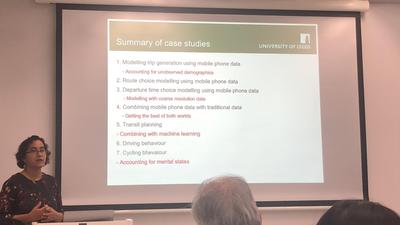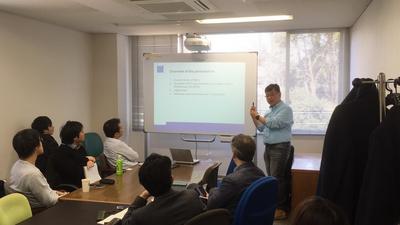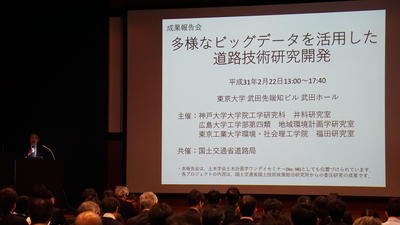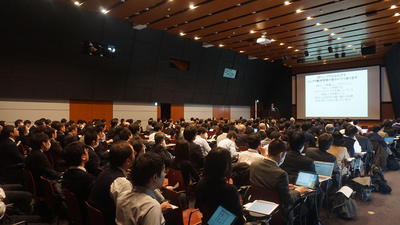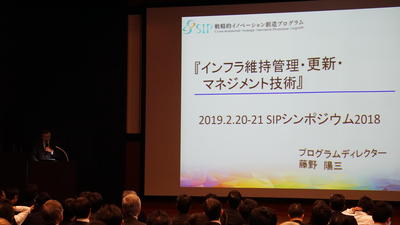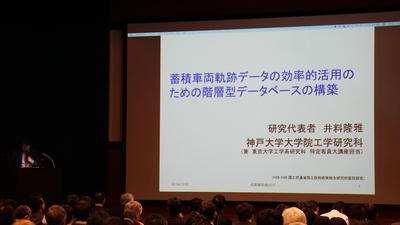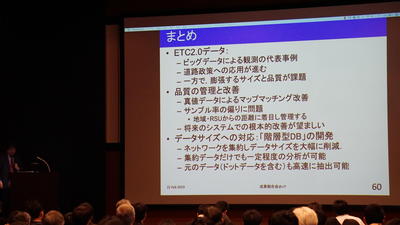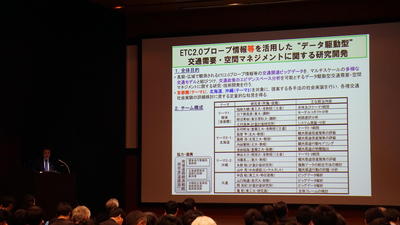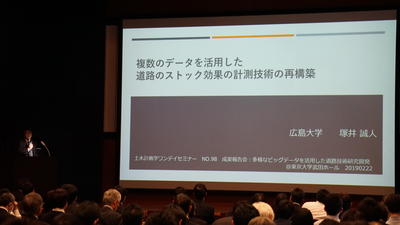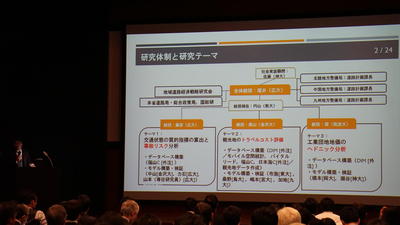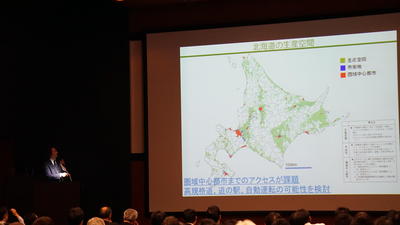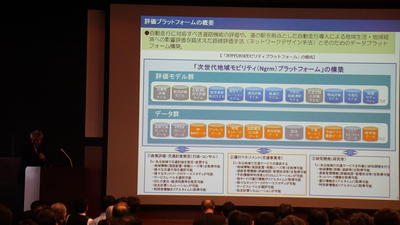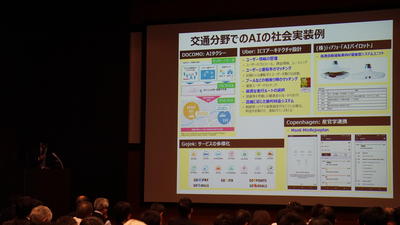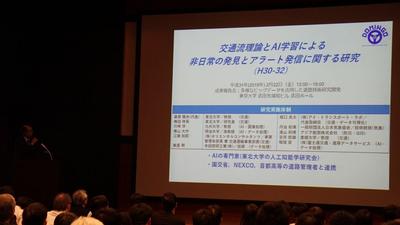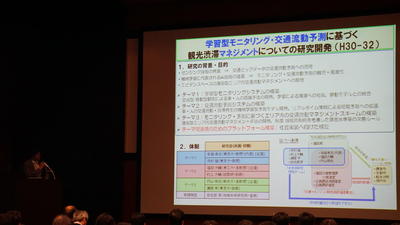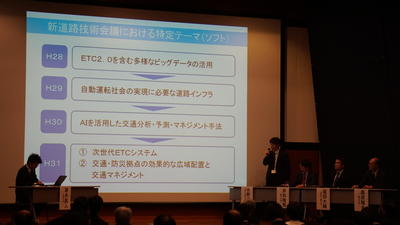[Finished]Kick-off Symposium of 3DTraffic project
Salsa-sann, a project researcher in the Fukuda Lab, have made a report for kick off event of 3DTraffic Project in Bangkok. Below is the report.
I am Salsa, a Project Researcher in the Fukuda Lab.
Currently, Prof. Fukuda, Dr. Fujiwara, Krittanai, and I are involved in a project called 3DTraffic SATREPS Project. The project is a collaborative research project between research institutions in Japan and Thailand and aims to reduce the greenhouse gas emissions in Bangkok through the improvement of traffic control.
On Monday, May 20, 2025, we had some events to initiate our project at Chulalongkorn University, Bangkok, Thailand. The events started with a Joint Coordination Committee meeting in the morning, followed by 3DTraffic Lab Opening Ceremony, the Kick-off Symposium, and ended with a reception dinner. The Kick-off Symposium was open for the general public to attend, and the event was conducted hybrid style (on-site and online webinar participation), so I was able to attend the webinar from my home in Tokyo.
The symposium started with remarks from Prof. Kasem Choocharukul of Chulalongkorn University and Mr. Haruka Ozawa from the Embassy of Japan in Thailand. As the Project Investigator of 3DTraffic, Prof. Daisuke Fukuda also elaborated on the overview of 3DTraffic project. We were also honored to have Distinguished Professor Yoshitsugu Hayashi (Tokaigakuen University) delivered a keynote lecture at our event. As the project leader of the previous SATREPS project, which also took Bangkok as a case study, we gained a lot of insights from Prof. Hayashi’s speech about Bangkok’s historical to present mobility and urban conditions, also how the Quality of Life and CO2 emissions can be improved through the transformation of city structure and optimizing QoL-MaaS scenario, advices that came from his project.
Each working group also had the chance to present their study plans and what they are aiming to achieve within the 5-year period of this project. A panel discussion session was held, with Prof. Yoshitsugu Hayashi, Prof. Takashi Oguchi, Prof. Sorawit Narupiti, and Prof. Kasem Choocharukul as panelists and Mr. Yoshihisa Asada as the moderator. 3 main topics guided the discussion, and the experts gave their invaluable opinions about the legacies that can be utilized in the project, the kind of output that the project shall disseminate, and the project’s prospect in developing human resources. The event was closed with a remark from Prof. Sorawit.
We are grateful that despite their busy schedule, many people participated in the event since the morning, including various Thai government agencies involved in transportation planning and traffic management in Bangkok, representatives from Japanese government agencies, and researchers from various institutions who are members of the 3DTraffic project. We are looking forward to having a good collaboration with everyone, and we are committed to giving our best to reach the goals in our project!
For those who are interested in knowing more about our project, please visit our website: https://www.3dtraffic.t.u-tokyo.ac.jp/
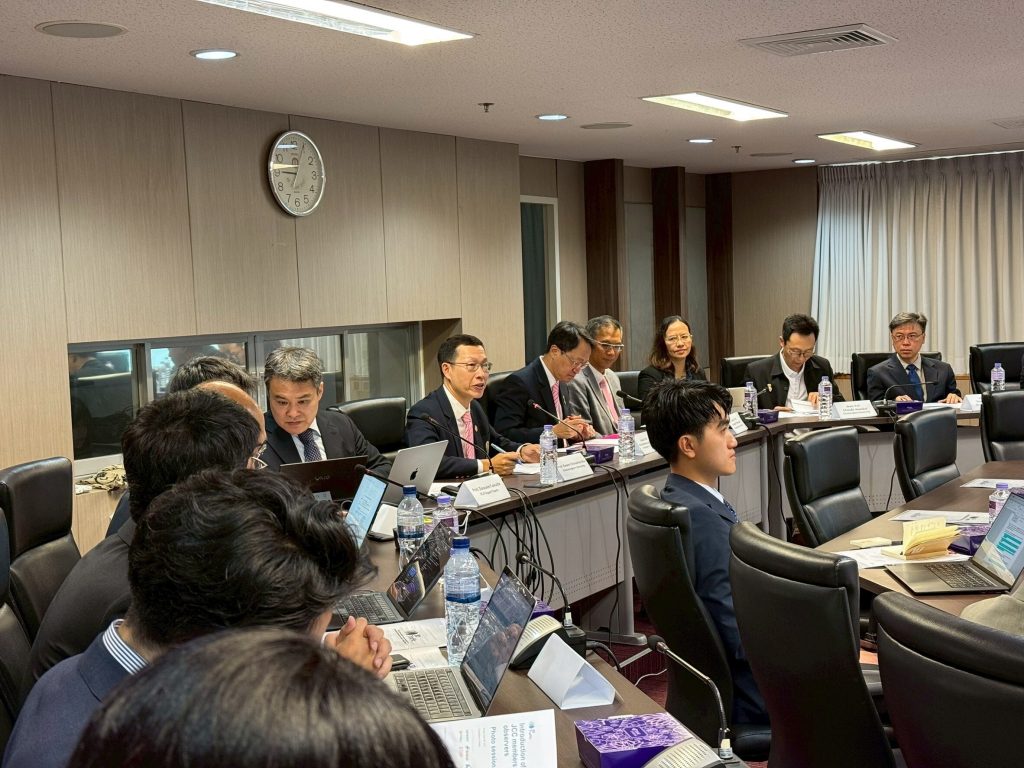
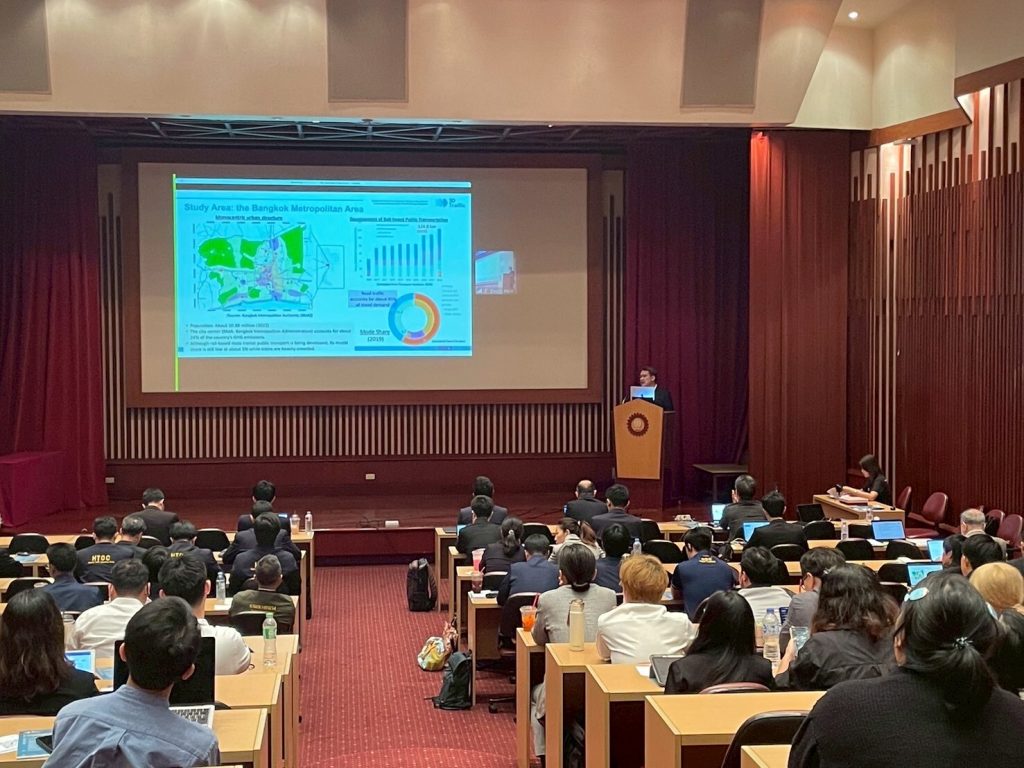
(Photos by 3DTraffic Event Organizing Team)
Kick-off Symposium of 3DTraffic project
Salsa-sann, a project researcher in the Fukuda Lab, have made a report for kick off event of 3DTraffic Project in Bangkok. Below is the report.
I am Salsa, a Project Researcher in the Fukuda Lab.
Currently, Prof. Fukuda, Dr. Fujiwara, Krittanai, and I are involved in a project called 3DTraffic SATREPS Project. The project is a collaborative research project between research institutions in Japan and Thailand and aims to reduce the greenhouse gas emissions in Bangkok through the improvement of traffic control.
On Monday, May 20, 2025, we had some events to initiate our project at Chulalongkorn University, Bangkok, Thailand. The events started with a Joint Coordination Committee meeting in the morning, followed by 3DTraffic Lab Opening Ceremony, the Kick-off Symposium, and ended with a reception dinner. The Kick-off Symposium was open for the general public to attend, and the event was conducted hybrid style (on-site and online webinar participation), so I was able to attend the webinar from my home in Tokyo.
The symposium started with remarks from Prof. Kasem Choocharukul of Chulalongkorn University and Mr. Haruka Ozawa from the Embassy of Japan in Thailand. As the Project Investigator of 3DTraffic, Prof. Daisuke Fukuda also elaborated on the overview of 3DTraffic project. We were also honored to have Distinguished Professor Yoshitsugu Hayashi (Tokaigakuen University) delivered a keynote lecture at our event. As the project leader of the previous SATREPS project, which also took Bangkok as a case study, we gained a lot of insights from Prof. Hayashi’s speech about Bangkok’s historical to present mobility and urban conditions, also how the Quality of Life and CO2 emissions can be improved through the transformation of city structure and optimizing QoL-MaaS scenario, advices that came from his project.
Each working group also had the chance to present their study plans and what they are aiming to achieve within the 5-year period of this project. A panel discussion session was held, with Prof. Yoshitsugu Hayashi, Prof. Takashi Oguchi, Prof. Sorawit Narupiti, and Prof. Kasem Choocharukul as panelists and Mr. Yoshihisa Asada as the moderator. 3 main topics guided the discussion, and the experts gave their invaluable opinions about the legacies that can be utilized in the project, the kind of output that the project shall disseminate, and the project’s prospect in developing human resources. The event was closed with a remark from Prof. Sorawit.
We are grateful that despite their busy schedule, many people participated in the event since the morning, including various Thai government agencies involved in transportation planning and traffic management in Bangkok, representatives from Japanese government agencies, and researchers from various institutions who are members of the 3DTraffic project. We are looking forward to having a good collaboration with everyone, and we are committed to giving our best to reach the goals in our project!
For those who are interested in knowing more about our project, please visit our website: https://www.3dtraffic.t.u-tokyo.ac.jp/


(Photos by 3DTraffic Event Organizing Team)
[Finished] Lecture at the 37th TSU Seminar
[August 22, 2019]
Today, a TSU seminar on transportation big data was held on campus by Prof. Charisma F. Choudhury.
Dr. Charisma is an associate professor at the University of Leeds (UoL), UK, where she leads the Choice Modelling Research Group and works primarily on choice models. The car driving behavioral model developed as part of her thesis has been implemented in major commercial traffic simulation tools such as AIMSUN and VISSIM.
In today’s lecture, he used anonymous big data such as cell phone location data and call log data as case studies to propose frameworks such as latent demographic models, compare them with existing data (e.g., questionnaire-based surveys), and analyze traffic conditions by combining them with machine learning. She also explained about traffic analysis in combination with machine learning.
The following is a short summary of the lecture that was presented at the 37th TSU Seminar.
ーーーーーーーーーーーーーーーーーーーーーーーーーーーーーー
“The 37th TokyoTech TSU Seminar“
We will hold TSU(Transport Studies Unit) public seminar.
( Overviewed announcement → http://www.transport-titech.jp/seminar_visitor.html )
( Detailed announcement → http://www.transport-titech.jp/seminar_visitor/2019/TSU-SV2019-037.pdf)
Presentation Title: Travel behaviour modelling using emerging big data sources
Date: August 22th (Thu.) 2019
Time: 15:00 -16:30
Venue: Tokyo Tech. Ookayama Campus, Multi-Purpose Room, 1st Floor, Midorigaoka Buidling #6
(https://www.titech.ac.jp/english/maps/ookayama/midorigaoka.html)
Speaker: Charisma F. Choudhury, PhD, FHEA
Deputy Director, Choice Modelling Centre Associate Professor,
Institute for Transport Studies & School of Civil Engineering
University of Leeds, Leeds, UK
Presentation Abstract:
Over the last decade, passively generated big data sources have emerged as a very promising source of activity and mobility information. Examples include GPS, mobile phone, smartcard and social media data, online browsing and purchase records of tickets, cars/bikes, residential properties, etc. However, due to the coarse spatial and temporal resolution, sampling and privacy issues, these data sources are yet to be used for mainstream travel behaviour modelling. The presentation will include four case studies on how these big data sources can be used for mainstream transport modelling – each focusing on a unique limitation of the big data. Case study 1 proposes a ‘latent demographic model’ framework to utilize large scale anonymous data from mobile phones and applies it in the context of trip generation modelling in Switzerland. Case study 2 proposes an application of the ‘broad choice modelling’ framework to deal with the coarse spatio-temporal resolution of the mobile phone data in the context of route choice modelling using call detail record data from Senegal. Case study 3 contrasts the performances of mobile phone and GPS data in the context of departure time choice modelling in Switzerland. Case study 4 proposes a methodology to fuse the household survey and mobile phone data to get the best out of both worlds. The presentation will conclude by summarizing the insights gained from these studies and an overview of some other ongoing research.
Bio:
Charisma Choudhury is an Associate Professor at the Institute for Transport Studies and School of Civil Engineering at the University of Leeds (UoL)where she leads the Choice Modelling Research Group. She also serves as the Deputy-Director of the interdisciplinary Choice Modelling Centre, UoL. Prior to joining UoL, she has worked as an Assistant Professor at Bangladesh University of Engineering and Technology (BUET), as a Postdoctoral Research Associate at Massachusetts Institute of Technology (MIT) and as Analysts in RAND Europe, UK and Cambridge Systematics, USA. Charisma holds PhD and MSc from MIT. For her doctoral work, she had focused on developing driving behaviour models with ‘Dynamic Latent Plans’. The driving behaviour models developed as part of her thesis have been implemented in leading commercial traffic simulation tools including AIMSUN and VISSIM. In recognition of her doctoral research, she has received the Gordon Newell Best Dissertation Prize from the HKSTS and an Honourable Mention from the IATBR. Her research interests include travel behaviour modelling using emerging data sources and transport issues in the Global South.
TSU Seminar (Prof. Yusak Susilo, 12 March)
[18 March, 2019]
A mini-seminar on the Probe Person survey application was held on campus by Prof. Yusak Susilo.
Prof. Susilo is a professor at the Royal Institute of Technology (KTH) in Sweden, and is active in the International Association for Travel Behaviour Research (IATBR). In this mini-seminar, he explained about the open-source application “MEILI,” which was developed by him and his colleagues. “MEILI” is an application that collects GPS traces of multiple users from the origin to the destination of their trips. It has been increasingly adopted in urban traffic surveys in developing countries by European countries and JICA. Moreover, some application examples of “MEILI” have been introduced.
Research Report Seminar, “Research and Development of Road Technology Utilizing Various Big Data” (February 22)
[22 February, 2019]
We held a seminar, “Research and Development of Road Technology Utilizing Various Big Data”, in collaboration with Iryo Laboratory, Kobe University, Tsukai Laboratory, Hiroshima University, and Ministry of Land, Infrastructure, Transport, and Tourism (MLIT). In this briefing seminar, each project leader introduced the outline of their research on three specific projects (ETC2.0, autonomous driving, and AI for sightseeing), which are being conducted by the MILT’s Highway Bureau as part of the “New Road Technology Development Project”. Moreover, we also discussed on the future research direction and the development of road technology using various big data.
The seminar was so successful that the room was almost full. Thank you very much for your attendance. The following is a summary of the seminar.
At the beginning of the seminar, Prof. Yozo Fujino, a senior distinguished professor at Yokohama National University, gave a keynote speech on the prospects of AI and Big Data applications, mainly in the hardware field.
Prof. Iryo of Kobe University gave a presentation on the construction of a hierarchical database to improve computational efficiency when using vehicle trajectory data.
Prof. Fukuda, an associate professor of our laboratory, presented the results of research related to ETC2.0 and Wi-Fi, in which he has been mainly engaged for the past three years.
Prof. Tsukai, an associate professor of Hiroshima University, presented his research on the reconstruction of road stock effect measurement technology.
In addition, Prof. Arimura, an associate professor at Muroran Institute of Technology, and Prof. Harada, a professor at the University of Tokyo, made presentations on the road infrastructure required for the realization of an autonomous driving society.
Then, Prof. Rikiishi, an associate professor at Hiroshima University, Prof. Kuwahara at Tohoku University, and Prof. Fuse at the University of Tokyo presented their researches on the development of traffic analysis, prediction, and management methods using AI.
Finally, Mr. Mizuno of the MILT’s Road Bureau, gave a presentation on the future research direction and development of road technology utilizing various big data, and a panel discussion followed.
The following is a recap of the program of the day.
ーーーーーーーーーーーーーーーーーーーーーーーー
Presentation: Research and Development of Road Technology Utilizing Various Big Data
Date: Friday, 22 February 2019, 13:00-17:40
Venue: Takeda Hall, Takeda Advanced Knowledge Building, The University of Tokyo (2-11-16 Yayoi, Bunkyo-ku, Tokyo 113-0032, Japan)
Organized by:
- Iryo Laboratory, Department of Civil Engineering, Graduate School of Engineering, Kobe University
- Regional Environmental Planning Laboratory, Department of Social and Environmental Engineering Program, Faculty of Engineering, Hiroshima University
- Fukuda Laboratory, Department of Civil and Environmental Engineering, School of Environmental and Social Science, Tokyo Institute of Technology
Co-organized by: Road Bureau, Ministry of Land, Infrastructure, Transport and Tourism
[Program]
13:00 Opening: Daisuke Fukuda, Associate Professor, Tokyo Institute of Technology
13:05 ATP Special Invited Lecture
Yozo Fujino (Senior Distinguished Professor, Yokohama National University Advanced Institute for Advanced Science and Technology, Professor Emeritus, The University of Tokyo)
Prospects for AI and Big Data Applications in Infrastructure Maintenance and Management
13:40 Final year results report on the specific project “Various Big Data Applications including ETC2.0” (25 min. x 3 persons)
Takamasa Iryo (Professor, Graduate School of Kobe University)
Construction of a Hierarchical Database for Efficient Utilization of Stored Vehicle Track Data
Daisuke Fukuda (Associate Professor, Tokyo Institute of Technology)
Research and Development of “Data-driven” Traffic Demand and Spatial Management Using ETC2.0 Probe Information, etc.
Makoto Tsukai (Associate Professor, Hiroshima University)
Reconstruction of technology for measuring road stock effectiveness using multiple data sources
14:55 Break
15:05 Specific Subject: “Road Infrastructure Required for the Realization of an Autonomous Driving Society”: Report for the second fiscal year
Kanji Arimura (Associate Professor, Muroran Institute of Technology)
Research and Development of New Road Transportation Policies to Support Production Space Using Autonomous Driving and Road Stations”
Noboru Harada (Professor, University of Tokyo)
A new road stock evaluation method for the diffusion of automated driving systems in convection-type regional blocs
15:45 Report on the first year of the project “Development of AI-based Traffic Analysis, Forecasting and Management Methodology
Makoto Rikiishi (Associate Professor, Graduate School of Hiroshima University)
Research and development of short-term traffic forecasting method and comprehensive traffic demand management based on AI technology”
Masao Kuwahara (Professor, Tohoku University)
Detection and Alerting of Unusual Events by Traffic Flow Theory and AI Learning
Takashi Fuse (Professor, The University of Tokyo)
Research and development of tourism congestion management based on learning-based monitoring and traffic flow forecasting
16:30 Break
16:45 Panel Discussion (45 minutes) “Prospects for R&D on Road Technology Utilizing Various Big Data
Makoto Tsukai [Organizer]
Koji Mizuno [Director, Evaluation Office, Planning Division, Road Bureau, MLIT], Takamasa Iryo, Daisuke Fukuda, Masao Kuwahara
17:30 Closing (40 minutes) Takamasa Iryo (Professor, Graduate School of Kobe University)
18:00 Reception @ University of Tokyo Co-op Cafeteria 2 [3,000 yen/person, advance registration required].
International Mini-Workshop on Transport and Traffic Big-Data (Feb. 22)
I am happy to announce that we will organize the following workshop together with Prof. Takamasa Iryo and Prof. Makoto Tsukai.
International Mini-Workshop on Transport and Traffic Big-Data: Theory and Practice
Date: February 22nd (Friday), 2019 9:30 – 12:10
Venue: Lecture Room No. 15 (1st Floor), Faculty of Engineering Bldg. 1
The University of Tokyo, Hongo Campus (https://www.t.u-tokyo.ac.jp/foee/access.html)
Registration:
https://docs.google.com/forms/d/e/1FAIpQLSeYvSwX-9Gu0UYgTd08Z-ARojTe1o5iTeemH2t10oDuGEDmIA/viewform?vc=0&c=0&w=1
Hosted by:
Iryo lab., Dept. Civil Eng., Graduate School of Engineering, Kobe University
Tsukai Lab., Dept. Civil Eng., Graduate School of Engineering, Hiroshima University
Fukuda Lab., Dept. Civil Eng., School of Environment & Society, Tokyo Institute of Technology
Program
9:30 Opening Remarks
Takamasa Iryo (Professor, Kobe University)
9:35 Invited speaker
Jeff Ban (Associate Professor, University of Washington)
“Transportation Big Data: Promises and Challenges”
10:35 Break (10 min.)
10:45 Young researchers’ presentations (20 min. × 4 presentations)
Takahiko Kusakabe (Lecturer, The University of Tokyo)
Toru Seo (Assistant Professor, The University of Tokyo)
Qian Ge (Postdoctoral researcher, Tokyo Institute of Technology)
Katsuya Sakai (Assistant Professor, National Taiwan University)
12:05 Closing Remarks
Daisuke Fukuda (Associate Professor, Tokyo Institute of Technology)
[Finished] The 31st TSU Seminar “Future Cities Lab. Dr. Pieter J. Fourie”
[The presentation was successfully finished.].
Happy New Year! We are pleased to invite Dr. Pieter J. Fourie to Tokyo Tech for the 31st TSU Seminar. He is the leader of the Engaging Mobility Team at the Future Cities Laboratory, ETH Zurich’s transportation research branch in Singapore, where he is promoting a project on traffic big data analysis. In this seminar, he will talk about autonomous vehicles as well as other projects in the lab.
The 31st TokyoTech TSU
(Date & Time)
Jan. 9th, 2018, 1PM-3PM
(Place) Tokyo Institute of Technology
Tokyo Institute of Technology, Midorigaoka Building No.5 (M5), 2F,
Small Meeting Room
http://www.plan.cv.titech.ac.jp/fukudalab/contact/
http://www.plan.cv.titech.ac.jp/fukudalab/en/contact/
(Speaker)
Dr. Pieter J. Fourie (Future Cities Laboratory@Singapore, ETH Zurich)
http://www.fcl.ethz.ch/people/Researchers/PieterFourie.html
(Title)
Towards integrated urban design and simulation of autonomous vehicles:
Engaging mobility @ Future Cities Laboratory
Lecture on public transportation maintenance and land use (July 18) [Finished]
We invited Dr. Jin Murakami from City University of Hong Kong to hold the following seminar.
Date: July 18, 2016 (Monday) 16:30-18:00 @ Conference Room 1, 1F, Midorigaoka Bldg. 6
“Public Land around Transportation for Sustainable Finance and Urbanism: Hong Kong, Singapore, and Mainland China”
By Jin Murakami, Ph.D.
Department of Architecture and Civil Engineering, City University of Hong Kong
[Abstract] While transportation infrastructure has been seen as a “backbone” in Asian city-states’ territorial development strategies, public land administration has been playing an even more pivotal role in achieving their sustainable finance and urbanism under state leasehold systems. Despite its practical importance, there is still a paucity of empirical research on public land transactions around transportation facilities across Asian city-states. This research presents how selected Asian city-states successfully or unsuccessfully coordinate public land leases together with mega-transportation infrastructure projects from both financial and geographical perspectives. This presentation also covers some figures and preliminary analysis on private (non-residential) property transactions and real estate investment trusts (H-REITs) in guiding the World’s densest urbanization of Hong Kong and stresses the importance of strategic public-private land coordination in shaping Japan’s “compact cities” in competitive and sustainable ways.
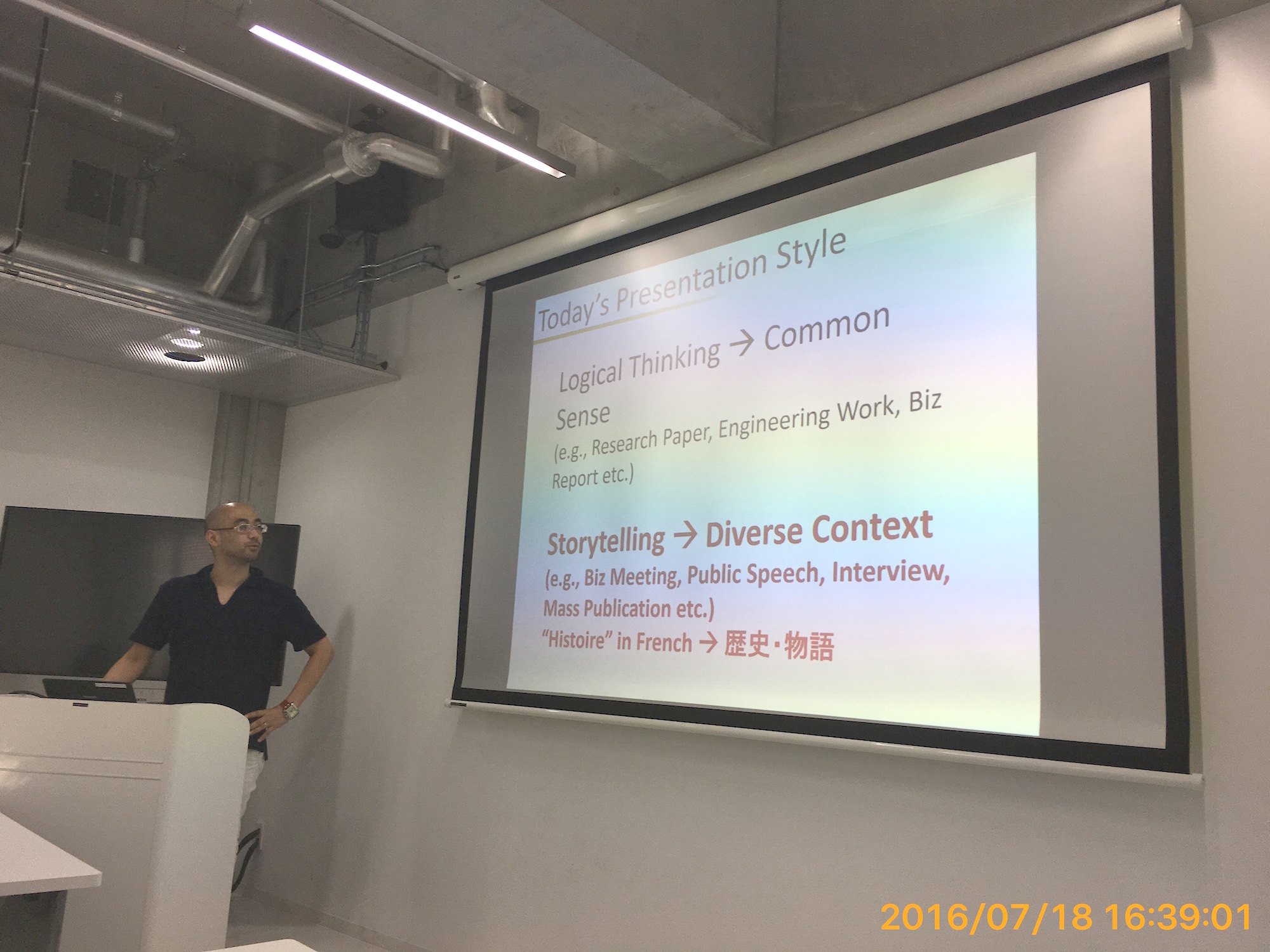
Workshop on Route Choice Modeling (June 11) [Finished].
The Transport Studies Unit (TSU) of Tokyo Tech will hold the following seminar on route choice modeling as part of the activities of the Grant-in-Aid for Scientific Research (Kakenhi), “Systematization of Evaluation and Operation Methods for Travel Time Reliability in Urban Transportation Systems”, and the New Road Technology Development Project, “Research and Development of ‘Data-driven’ Transportation Demand and Spatial Management Using ETC2.0 Probe Information”. The seminar on route selection modeling will be held as part of the activities of the new road technology development project “Research and Development of “Data-driven” Traffic Demand and Spatial Management Using ETC2.0 Probe Information”.
The 15th Tokyo Institute of Technology TSU (Transport Studies Unit) Seminar, “Latest trends in route choice studies” (http://urx.blue/udmQ)
Date: Saturday, June 11, 2016, 14:00-17:30
Place: Conference Room at the Midorigaoka Bldg. 5 [Creative Project Building] 1F, Ookayama Campus, Tokyo Institute of Technology. (http://www.plan.cv.titech.ac.jp/fukudalab/contact/)
Speakers:
(1) Dr. Makoto Rikiishi, Hiroshima University
Route Choice Models: Recent Research Trends and Proposals for New Models
(2) Mr. Kohei Ohta, Navitime Japan
Application of Route Choice Models in Route Searching Service and Big Data Analysis
(3) Mr. Tatsuya Iwase, Toyota Central R&D Labs.
(4) “Eliminating Road Hunting Phenomenon Using a Belief Design Approach”
For registration and inquiries, please contact
Daisuke Fukuda, Department of Civil and Environmental Engineering, School of Environment and Society, Tokyo Institute of Technology.
Email: fukuda [at mark] plan.cv.titech.ac.jp
[If you wish to participate in this seminar, please send an e-mail by June 9.]
Special Seminar Series on Transportation Planning and Travel Behavioral Analysis @ UTokyo (5/28〜7/16)
Together with Prof. Hironori Kato of the University of Tokyo, we are organizing a series of international seminars on transportation planning and travel behavior analysis. We are looking forward to your participation.
[Japanese content is followed by English content]
交通計画・交通行動分析の連続国際セミナー
(Axhausen教授を囲む会)のお知らせ
- 主催者:加藤浩徳(東京大学),福田大輔(東京工業大学)
- 後援:土木学会土木計画学研究委員会
- 開催趣旨:本年4月より7月まで,スイス連邦工科大学(ETH)チューリッヒ校のKay Axhausen教授が,東京大学の客員研究員として滞在されています.Axhausen教授は,Transportation誌の編集長を務めるなど,交通計画・交通行動分析の分野で世界的に広く知られる研究者です(詳しくは,http://www.ivt.ethz.ch/people/axhausen).せっかくの機会ですので,Axhausen教授にご参加いただいて,交通計画・交通行動分析に関わる国際セミナーを連続で開催します(Axhausen教授は,全ての回に出席される予定です).皆様のご参加をお待ちしております.
- 場所:東京大学・本郷キャンパス工学部11号館3階国際プロジェクト研究室会議室(113-8656 東京都文京区本郷7-3-1,http://www.u-tokyo.ac.jp/campusmap/cam01_04_12_j.html)
- 参加費:無料(参加人数を知りたいので,参加を希望される方は,事前に加藤先生(kato[at mark]civil.t.u-tokyo.ac.jp)までご連絡願います.)
- 言語:英語のみです.
- その他:終了後に簡単な懇親会を開催する予定です.
- スケジュール
第3回 6月12日(金)16:00-18:00
第4回 6月19日(金)16:00-18:00
第5回 6月25日(木)16:00-18:00
第6回 7月3日(金)16:00-18:00
第7回 7月16日(木)17:00-19:00
